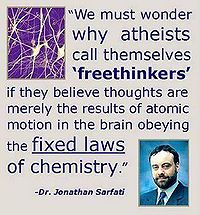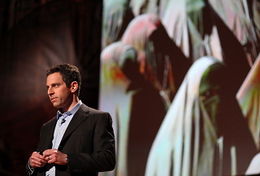Concerning atheism and open-mindedness, The Independent reported in an article entitled Atheists are less open-minded than religious people, study claims:
| “ | Religious people are more tolerant of different viewpoints than atheists, according to researchers at a Catholic university.
A study of 788 people in the UK, France and Spain concluded that atheists and agnostics think of themselves as more open-minded than those with faith, but are are actually less tolerant to differing opinions and ideas. Religious believers "seem to better perceive and integrate diverging perspectives", according to psychology researchers at the private Catholic University of Louvain (UCL), Belgium's largest French-speaking university. Filip Uzarevic, who co-wrote the paper, said his message was that "closed-mindedness is not necessarily found only among the religious".[1] |
” |
PsyPost indicates:
| “ | New research indicates that religious believers can be better at perceiving and integrating different perspectives than atheists in Western Europe.
“The main message of the study is that closed-mindedness is not necessarily found only among the religious,” the study’s corresponding author, Filip Uzarevic of the Catholic University of Louvain, told PsyPost. The research was published April 27, 2017, in the peer-reviewed journal Personality and Individual Differences. Atheists tended to show greater intolerance of contradiction, meaning when they were presented with two seemingly contradictory statements they rated one as very true and the other as very false. They also showed less propensity to be able to imagine arguments contrary to their own position and find them somewhat convincing.[2] |
” |

The abstract for the 2017 journal article Are atheists undogmatic? published in the journal Personality and Individual Differences states:
- "Previous theory and evidence favor the idea that religious people tend to be dogmatic to some extent whereas non-religious people are undogmatic: the former firmly hold beliefs, some of which are implausible or even contrary to the real world evidence. We conducted a further critical investigation of this idea, distinguishing three aspects of rigidity: (1) self-reported dogmatism, defined as unjustified certainty vs. not standing for any beliefs, (2) intolerance of contradiction, measured through (low) endorsement of contradictory statements, and (3) low readiness to take a different from one's own perspective, measured through the myside bias technique. Non-believers, at least in Western countries where irreligion has become normative, should be lower on the first, but higher on the other two constructs. Data collected from three countries (UK, France, and Spain, total N = 788) and comparisons between Christians, atheists, and agnostics confirmed the expectations, with agnostics being overall similar to atheists."[3]
A majority of the world's atheists are East Asians (see: Asian atheism). The journal article Deviance or Uniqueness, Harmony or Conformity? A Cultural Analysis published in the Journal of Personality and Social Psychology indicates: "In many East Asian cultural contexts, there is an abiding fear of being on one's own, of being separated or disconnected from the group; a desire for independence is cast as unnatural and immature (Markus & Kitayama, 1994)."[4] China, which has state atheism, is well-known for having a repressive regime that does not tolerate deviance from the ideology of the Chinese Communist Party.
Contents
New Atheism and open-mindedness[edit]
See also: New Atheism, dogmatism and Jonathon Haidt's study
New Atheism is a contemporary form of militant atheism. The new atheist Richard Dawkins said about New Atheism, "[O]ur struggle is not so much an intellectual struggle, as a political one: What are we going to do about it?”.[5]
Using special text analysis software, the social psychologist Jonathan Haidt found that new atheists very often wrote in dogmatic terms in their major works using words such as “always,” “never,” “certainly,” “every,” and “undeniable.”[6] Of the 75,000 words in new atheist Sam Harris' The End of Faith, 2.24% of them connote or are associated with certainty.[7]
Springerlink indicates in the abstract for New Atheism, Open-Mindedness, and Critical Thinking by Christopher R. Cotter (first presented at the (New) Atheism, Scientism, and Open-Mindedness Conference, Lancaster University, April 3, 2012 and the Workshop for the Interdisciplinary Study of Religion and Culture, University of Edinburgh, April 25, 2012):
| “ | A common theme throughout the writings of Richard Dawkins, Daniel Dennett, Sam Harris, and the late Christopher Hitchens is the importance of ‘critical thinking’. Not only do these authors believe that they themselves are critical thinkers, they also advocate critical thinking as a key element in their idealized atheistic future. This chapter has been written to assess the veracity of their claims to critical thinking in their engagements with ‘religion’, via an engagement with related literature on ‘open-mindedness,’ particularly the work of William Hare and Harvey Siegel. An analysis of this nature is not merely of academic interest, but is of great importance given the popularity of their books both within and outside the atheistic milieu, the near-canonical status that they have achieved, and the effects of their rhetoric upon the beliefs and practices of individuals in the ‘real’ world. The argument in this chapter flows sequentially through delineations of the concepts of ‘open-mindedness’ and ‘critical thinking’, and a demonstration of the New Atheists’ valorization of critical thinking, before discussing open-mindedness as a constituent part of critical thinking, and then building a three stage argument to demonstrate that the New Atheists are not open-minded, and that therefore they are not critical thinkers (in the context of their most popular considerations of ‘religion’).[8] | ” |
In a 2014 New Republic article entitled The Closed Mind of Richard Dawkins: His atheism is its own kind of narrow religion, the atheist philosopher John Gray wrote:
| “ | One might wager a decent sum of money that it has never occurred to Dawkins that to many people he appears as a comic figure. His default mode is one of rational indignation—a stance of withering patrician disdain for the untutored mind of a kind one might expect in a schoolmaster in a minor public school sometime in the 1930s. He seems to have no suspicion that any of those he despises could find his stilted pose of indignant rationality merely laughable. “I am not a good observer,” he writes modestly. He is referring to his observations of animals and plants, but his weakness applies more obviously in the case of humans. Transfixed in wonderment at the workings of his own mind, Dawkins misses much that is of importance in human beings—himself and others.[9] | ” |
Antitheism and open-mindedness[edit]

See also: Antitheism and Antitheism and antisocial behavior and Atheism and narcissism and Atheism and anger
Antitheism is active opposition to and hatred of theistic belief. It is distinguished from simple atheism in that it is not simply a rejection of belief in God; rather, the antitheist is actively opposed to such belief.[10] While a particular atheist might be content to deny the existence of God, but leave others to their own faith, the antitheist will actively seek to undermine or eliminate the faith of others. Thus, all antitheists are atheists, but not all atheists are necessarily antitheists. Antitheism is also sometimes referred to as militant atheism, and is prominent amongst people who see religion as promoting "hatred".
In the United States, a University of Tennessee study estimated that 15% of American atheists were antitheists.[11]
Social science research indicates that antitheists score the highest among atheists when it comes to personality traits such as narcissism, dogmatism, and anger.[12][13] Furthermore, they scored lowest when it comes to agreeableness and positive relations with others.[12]
Atheism, open-mindedness and groupthink[edit]
See also: Atheism and groupthink
Groupthink is a psychological phenomenon that occurs within a group of individuals in which the quest for harmony/conformity within the group results in irrational and/or poor decision-making.
In relation to atheism and groupthink, the atheist website Atheist Revolution declared about segments of the atheist population:
| “ | We've seen various cliques emerge, some of which have largely abandoned critical thinking for dogma. This mutual admiration society strikes me as being antithetical to free thought, as similar ideas are rewarded through promotion while diverse perspectives receive less attention. This sets the stage for a type of groupthink that runs counter to big tent atheism...
By elevating some in our movement to the level of celebrities, I fear we have cheapened it through irrational hero worship.[14] |
” |
Atheism and dogmatism[edit]
Atheism and intolerance[edit]
See also[edit]
Notes[edit]
- ↑ Atheists are less open-minded than religious people, study claims, The Independent, 2017
- ↑ Study finds the nonreligious can be more close-minded than the religious By ERIC W. DOLAN, PsyPost June 23, 2017
- ↑ Are atheists undogmatic?, Personality and Individual Differences, Filip Uzarevica, Vassilis Sarogloua, Magali Clobert, Volume 116, 1 October 2017, Pages 164-170
- ↑ Journal of Personality and Social Psychology, 1999. Vol. 77, No. 4, 785-800
- ↑ Faithless: The politics of new atheism by Steven Kettell
- ↑ Why Sam Harris is Unlikely to Change his Mind by JONATHAN HAIDT, February 3, 2014 8:36 pm
- ↑ Why Sam Harris is Unlikely to Change his Mind by JONATHAN HAIDT, February 3, 2014 8:36 pm
- ↑ New Atheism, Open-Mindedness, and Critical Thinking by Christopher R. Cotter
- ↑ The Closed Mind of Richard Dawkins, New Republic by John Gray
- ↑ http://dictionary.reference.com/search?q=Antitheist
- ↑ The 6 Types of Atheists and Non-Believers in America By Amanda Marcotte / AlterNet July 11, 2013
- ↑ 12.0 12.1 Science Shows New Atheists to be Mean and Closed-Minded
- ↑ Why Sam Harris is Unlikely to Change his Mind by JONATHAN HAIDT, February 3, 2014 8:36 pm
- ↑ Feeling Disillusioned With the Atheist Movement, Atheist Revolution

